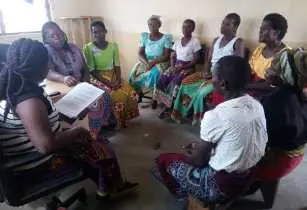An e-dialogue was convened by the Agricultural Policy Research Programme (APRA) to analyse the dynamics of agricultural commercialisation and agrarian change across East, West and Southern Africa
The event was held in partnership with the UN Sustainable Development Solutions Network (SDSN) and Foresight4Food (F4F). It began with participants engaging in three parallel regional presentations and discussions and culminated in a continental-level panel involving expert commentators and audience questions.
The Southern Africa session began with four presentations, highlighting key regional concerns. Mirriam Matita, APRA Malwai country lead and Economics PhD Student at the University of Malawi, began the proceedings by analysing lessons learned regarding groundnut commercialisation and livelihood trajectories in Malawi, and was followed by Loveness Msofi, lecturer at Lilongwe University of Agriculture and Natural Resources, who spoke on gender and social dynamics in commercialisation in Malawi.
Toendepi Shonhe, agricultural political economist at the University of South Africa, then looked at agricultural commercialisation, changing labour regimes, and rural transformation in Zimbabwe, before Chrispen Sukume, APRA Zimbabwe country lead and co-administrator at Zimbabwe’s Livestock and Meat Advisory Council, examined the impact of smallholder tobacco commercialisation on food security in the region.
Sustainability in inclusivity
Following these insights, expert commentator Kezia Batisai, associate professor at the University of Johannesburg, highlighted key shifts required to support agricultural transformation in the region. These include addressing the informality of the sector’s development due to poor execution of policy, ensuring any change to agricultural commercialisation is inclusive, sustainable and permanent, and directing resources to those who have historically been marginalised because of a lack of political power and connections.
Batisai also noted the need for gendered responses, as women land owners are currently struggling with gendered intergenerational land transfer biased towards male inheritance, often pushing women to the margins. “There’s a narrative that women are an add-on. There’s no deliberate effort to incorporate them more,” she said. “We need to pay more attention to marginality and put women at the forefront.”
Addressing the labour question
Next, Mutopo moved on to address another critical question of labour. She presented several myths that exist in Zimbabwe, including that there is a shortage of farm labour (when, in reality, unemployment is very high in many African countries), and that people working on farms solely do just that – when, in fact, most people are engaged in a number of diversified, income-generating activities.
During the general discussion, Matita also argued for the need to tailor solutions to different kinds of farmers; for example, smallholders versus those with large-scale operations. “We should not be treating smallholders the same as others,” she stated. “Smallholder farmers are participating in markets but barely surviving. They need greater support.”
To finish, Ian Scoones, co-director of the ESRC STEPS Centre of the Institute of Development Studies, highlighted that commercialisation is a complex process with no single trajectory, and that there is a need for wider and more agile policies to promote and enable commercialisations. “Commercialisation is non-linear and related to a variety of circumstances. Policies need to reflect this,” he added.
A wider perspective
Following the regional discussions, participants and speakers from each region came together to share key points and draw conclusions on a continental scale. Many focused on the issue of gender, with Mutopo calling on the group to consider the ‘missing women’, and the need to engage them rather than consider them as victims. Janice Olawoye, Professor at the University of Ibadan, noted that when the incomes of women farmers rise, health and educational outcomes improve. Batisai added that women need to be put into policymaking positions at all levels so they can become agents of change.
Closing remarks came from Ken Giller, professor of Plant Production Systems at Wageningen University. He highlighted several key action points, including the need to raise awareness of these issues among governments and policymakers, and the necessity of finding solutions that are flexible and can be adapted to a wide diversity of contexts.





